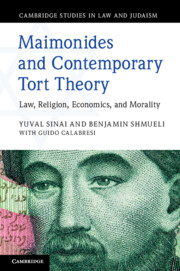Book contents
- Maimonides and Contemporary Tort Theory
- Cambridge Studies in Law and Judaism
- Maimonides and Contemporary Tort Theory
- Copyright page
- Contents
- Figures
- Introduction
- 1 Initial Presentation
- 2 Tort Liability in Maimonides’ Code:
- 3 The Foundations of the Maimonidean Theory:
- 4 The Deontological and Religious Elements of Maimonides’ Tort Theory
- 5 Consequentialist Considerations in the Guide for the Perplexed
- 6 Revisiting the Problematic Texts of the Code in Light of the Guide and Contemporary Scholarship
- 7 Maimonides’ Standard of Care:
- 8 Maimonides as a Pluralistic-Differential Scholar and Contemporary Tort Law Theories:
- 9 Reflections on Maimonides’ Tort Theory
- Index
9 - Reflections on Maimonides’ Tort Theory
Published online by Cambridge University Press: 10 August 2020
- Maimonides and Contemporary Tort Theory
- Cambridge Studies in Law and Judaism
- Maimonides and Contemporary Tort Theory
- Copyright page
- Contents
- Figures
- Introduction
- 1 Initial Presentation
- 2 Tort Liability in Maimonides’ Code:
- 3 The Foundations of the Maimonidean Theory:
- 4 The Deontological and Religious Elements of Maimonides’ Tort Theory
- 5 Consequentialist Considerations in the Guide for the Perplexed
- 6 Revisiting the Problematic Texts of the Code in Light of the Guide and Contemporary Scholarship
- 7 Maimonides’ Standard of Care:
- 8 Maimonides as a Pluralistic-Differential Scholar and Contemporary Tort Law Theories:
- 9 Reflections on Maimonides’ Tort Theory
- Index
Summary
Chapter 9 includes some insights and observations from the Hon. Prof. Calabresi on the major elements of the Maimonidean theory, especially those that are similar – more or less – to contemporary tort law and economics. Calabresi discusses law, economics, and justice in our era and in Maimonides’ theory of torts, and empirical differences in the different times and their implications. Calabresi also considers the question of whether there are differences between the differential liability model presented by Maimonides, and contemporary theories of the economic analysis of tort law, expanding on deontological as opposed to utilitarian considerations according to law and economics. Calabresi deals specifically with the issue of punitive damages and discusses the innovative analysis of Maimonides compared to the multiplier approach, distributive justice as presented by Maimonides, and his optimal deterrence model. There is a great deal in Maimonides that presaged both his work in particular and sophisticated modern law and economics generally. Calabresi notes that not only can we now understand Maimonides, and the breadth of his thinking better, but we also have a clearer picture of the strengths and weaknesses of modern scholarship.
Keywords
- Type
- Chapter
- Information
- Maimonides and Contemporary Tort TheoryLaw, Religion, Economics, and Morality, pp. 373 - 396Publisher: Cambridge University PressPrint publication year: 2020

